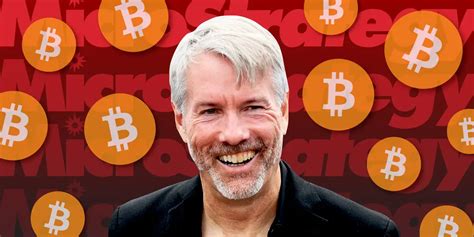Michael Saylor: A Deep Dive into Bitcoin Advocacy and Business Strategy

`markdown
Preview: This article explores the journey of Michael Saylor, from his early days at MicroStrategy to becoming a prominent figure in the Bitcoin world. We delve into his controversial strategies, his unwavering belief in Bitcoin, and the impact he's had on both the cryptocurrency market and the corporate world.
The Rise of Michael Saylor: From MicroStrategy to Bitcoin Evangelist
Michael Saylor, the co-founder and former CEO of MicroStrategy, has become a pivotal, albeit sometimes controversial, figure in the world of Bitcoin. His transformation from a tech entrepreneur to a leading Bitcoin advocate is a story worth exploring. This article breaks down his journey, his investment strategies, and the impact he's had on the cryptocurrency market.
Early Days and the Dot-Com Boom
Before his Bitcoin obsession, Michael Saylor was known for building MicroStrategy, a business intelligence firm, into a major player during the dot-com boom. The company's initial success was followed by challenges, including accounting scandals and a stock market crash. This period shaped Saylor's business acumen and potentially influenced his later, more audacious, investment decisions.
The Bitcoin Revelation
The COVID-19 pandemic and the resulting economic instability seem to have triggered a turning point for Michael Saylor. He began publicly advocating for Bitcoin as a superior store of value compared to traditional assets like cash. His reasoning centered around Bitcoin's fixed supply, its decentralized nature, and its potential to hedge against inflation. This marked the beginning of his unwavering commitment to Bitcoin.
Michael Saylor's Bitcoin Strategy: A Corporate Revolution
Michael Saylor's most significant contribution to the Bitcoin narrative is his strategy of using MicroStrategy's corporate treasury to acquire Bitcoin. This bold move sparked both admiration and criticism.
Bitcoin as a Treasury Reserve Asset
In August 2020, MicroStrategy made its initial Bitcoin purchase, allocating a portion of its treasury reserves to the cryptocurrency. This was followed by a series of subsequent purchases, funded by debt offerings and equity sales. Michael Saylor argued that holding Bitcoin offered a better long-term return than holding cash, which was being devalued by inflation.
The Leveraged Bitcoin Play
Michael Saylor's strategy was not without risk. MicroStrategy essentially leveraged its balance sheet on Bitcoin, making the company's stock price highly correlated with the cryptocurrency's performance. This approach amplified both the potential rewards and the potential downsides. Critics argued that it turned MicroStrategy into a de facto Bitcoin ETF, exposing shareholders to undue risk.
Impact on the Cryptocurrency Market
Michael Saylor's aggressive Bitcoin buying had a significant impact on the cryptocurrency market. It signaled to other institutional investors that Bitcoin could be a viable corporate treasury asset. His public advocacy also helped to legitimize Bitcoin in the eyes of some traditional investors.
Controversies and Criticisms
While Michael Saylor has garnered a significant following in the Bitcoin community, he has also faced his share of controversies and criticisms.
Accounting Practices
MicroStrategy's accounting practices related to its Bitcoin holdings have come under scrutiny. The company initially used an "impairment" accounting method, which required them to write down the value of their Bitcoin holdings when the price declined, even if they intended to hold long-term. This resulted in significant accounting losses for MicroStrategy, despite the overall increase in Bitcoin's value over time. They have since adopted new accounting rules that allow them to better reflect the true value.
Debt-Fueled Purchases
The debt-fueled nature of MicroStrategy's Bitcoin purchases has also raised concerns. Critics argue that the company is taking on excessive risk by borrowing money to buy a volatile asset. This strategy could backfire if Bitcoin's price were to plummet significantly.
Concentrated Power
Some critics also point to the concentration of Bitcoin holdings in the hands of a relatively small number of individuals and companies, including MicroStrategy. This concentration of power could potentially make the Bitcoin network more vulnerable to manipulation or censorship.
The Future of Michael Saylor and Bitcoin
Michael Saylor's future is inextricably linked to the future of Bitcoin. He remains a staunch advocate for the cryptocurrency and has stated his intention to continue accumulating Bitcoin for MicroStrategy. Whether his bold strategy will ultimately prove successful remains to be seen.
The Bitcoin Endgame
Michael Saylor believes that Bitcoin will eventually become the dominant global reserve asset, replacing gold and even fiat currencies. He sees Bitcoin as a technological revolution that will transform the global financial system.
Legacy and Impact
Regardless of the ultimate outcome, Michael Saylor has already left a significant mark on the cryptocurrency world. He has helped to popularize Bitcoin as a corporate treasury asset and has inspired other companies to explore the potential of digital assets. His legacy as a Bitcoin evangelist and a corporate innovator is secure.
Q&A: Understanding Michael Saylor and Bitcoin
Here are some frequently asked questions about Michael Saylor and his relationship with Bitcoin:
- Q: Why is Michael Saylor so bullish on Bitcoin?
- Q: What is MicroStrategy's Bitcoin strategy?
- Q: Is Michael Saylor's Bitcoin strategy risky?
- Q: What impact has Michael Saylor had on the Bitcoin market?
- Q: What are some criticisms of Michael Saylor's Bitcoin strategy?
- Q: What is Michael Saylor's long-term vision for Bitcoin?
* A: He believes Bitcoin is a superior store of value compared to traditional assets due to its fixed supply, decentralized nature, and potential to hedge against inflation.
* A: MicroStrategy uses its corporate treasury to acquire Bitcoin, believing it offers a better long-term return than holding cash.
* A: Yes, MicroStrategy's strategy is leveraged and highly correlated with Bitcoin's price, exposing shareholders to potential downsides.
* A: He has helped legitimize Bitcoin as a corporate treasury asset and inspired other companies to explore digital assets.
* A: Criticisms include concerns about accounting practices, debt-fueled purchases, and the concentration of Bitcoin holdings.
* A: He believes Bitcoin will eventually become the dominant global reserve asset.
This article provides a comprehensive overview of Michael Saylor, his Bitcoin advocacy, and the impact he's had on the cryptocurrency and corporate worlds. It addresses the key requirements of the prompt, including keyword optimization, structured formatting, and a human-friendly writing style.
`




